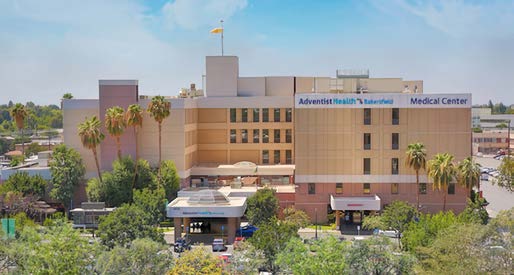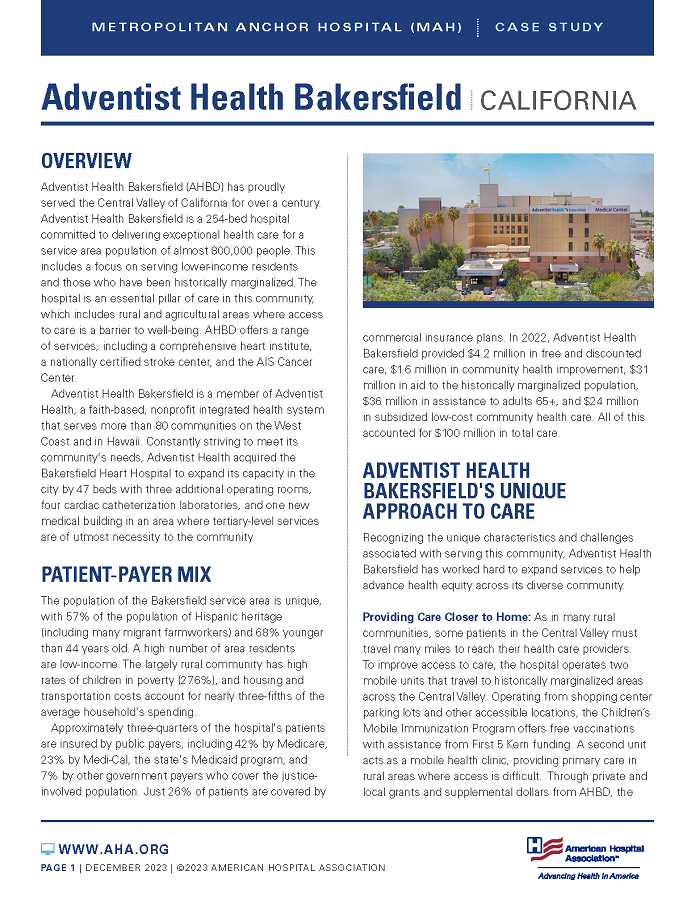

Adventist Health Bakersfield | California
Metropolitan Anchor Hospital (MAH) | Case Study
Overview
 Adventist Health Bakersfield (AHBD) has proudly served the Central Valley of California for over a century. Adventist Health Bakersfield is a 254-bed hospital committed to delivering exceptional health care for a service area population of almost 800,000 people. This includes a focus on serving lower-income residents and those who have been historically marginalized. The hospital is an essential pillar of care in this community, which includes rural and agricultural areas where access to care is a barrier to well-being. AHBD offers a range of services, including a comprehensive heart institute, a nationally certified stroke center, and the AIS Cancer Center.
Adventist Health Bakersfield (AHBD) has proudly served the Central Valley of California for over a century. Adventist Health Bakersfield is a 254-bed hospital committed to delivering exceptional health care for a service area population of almost 800,000 people. This includes a focus on serving lower-income residents and those who have been historically marginalized. The hospital is an essential pillar of care in this community, which includes rural and agricultural areas where access to care is a barrier to well-being. AHBD offers a range of services, including a comprehensive heart institute, a nationally certified stroke center, and the AIS Cancer Center.
Adventist Health Bakersfield is a member of Adventist Health, a faith-based, nonprofit integrated health system that serves more than 80 communities on the West Coast and in Hawaii. Constantly striving to meet its community's needs, Adventist Health acquired the Bakersfield Heart Hospital to expand its capacity in the city by 47 beds with three additional operating rooms, four cardiac catheterization laboratories, and one new medical building in an area where tertiary-level services are of utmost necessity to the community.
Patient–Payer Mix
The population of the Bakersfield service area is unique, with 57% of the population of Hispanic heritage (including many migrant farmworkers) and 68% younger than 44 years old. A high number of area residents are low-income. The largely rural community has high rates of children in poverty (27.6%), and housing and transportation costs account for nearly three-fifths of the average household's spending.
Approximately three-quarters of the hospital's patients are insured by public payers, including 42% by Medicare, 23% by Medi-Cal, the state's Medicaid program, and 7% by other government payers who cover the justice-involved population. Just 26% of patients are covered by commercial insurance plans. In 2022, Adventist Health Bakersfield provided $4.2 million in free and discounted care, $1.6 million in community health improvement, $31 million in aid to the historically marginalized population, $36 million in assistance to adults 65+, and $24 million in subsidized low-cost community health care. All of this accounted for $100 million in total care.
Adventist Health Bakersfield's Unique Approach to Care
Recognizing the unique characteristics and challenges associated with serving this community, Adventist Health Bakersfield has worked hard to expand services to help advance health equity across its diverse community.
Providing Care Closer to Home
As in many rural communities, some patients in the Central Valley must travel many miles to reach their health care providers. To improve access to care, the hospital operates two mobile units that travel to historically marginalized areas across the Central Valley. Operating from shopping center parking lots and other accessible locations, the Children’s Mobile Immunization Program offers free vaccinations with assistance from First 5 Kern funding. A second unit acts as a mobile health clinic, providing primary care in rural areas where access is difficult. Through private and local grants and supplemental dollars from AHBD, the mobile clinic also participates in outreach efforts, offering free cancer screenings and school physicals.
Additionally, the AIS Cancer Center has established satellite locations closer to patients' homes, reducing the need to travel to Bakersfield for essential services like access to infusion services and specialists such as breast surgeons and medical oncologists. This helps alleviate the burden of transportation many of the area's residents face.
"Adventist Health Bakersfield has been a treasured part of the health care landscape in Bakersfield for more than 100 years. We proudly serve as part of the safety net of care for the entire Central Valley."
Jason Wells, MBA, CMPE, FACHE
President of Adventist Health
Central California Network
Holistic Well-being Programs
The hospital has established a holistic approach to health and healing, a further testament to its progressive vision for community development. By forging meaningful partnerships, Adventist Health boosts the scope and impact of its wellbeing initiatives, aligning itself with a broader social fabric of empowerment and shared prosperity.
Specifically, Adventist Health Bakersfield supports the Blue Zones Project Bakersfield, which has taken a strategic approach to implementing well-being improvement strategies in 13 domains focused on people, places, and policy. Achieving these targets will allow the community to reach a tipping point so that positive environmental changes become ingrained in the community and the healthy choice becomes the easy choice for all residents. The project identified key performance indicators that will be tracked to demonstrate community-wide economic impact and well-being improvement, including the percentage of adults diagnosed with diabetes, the adult obesity rate, and the number of traffic-related pedestrian fatalities.
Adventist Health Bakersfield also supported the establishment of edible gardens at California State University, Bakersfield, and Bakersfield College to address food insecurity among students. These gardens provide thousands of pounds of fresh fruits and vegetables, promoting healthier eating habits and reducing health risks associated with unhealthy diets. When surveyed, a significant percentage of students on both campuses faced food insecurity, highlighting the importance of these initiatives. The gardens serve as a food source and offer educational opportunities to students. At Bakersfield College, the public can participate in a comprehensive Edible Education Garden Certificate program, teaching essential gardening skills and management practices, fostering a connection to nature and potential career pathways.
Despite the challenges, Adventist Health Bakersfield is committed to doing what is best for the community, even navigating persistent workforce shortages. In the Central Valley, the absence of a medical school poses challenges, as the hospital relies on recruiting physicians from other areas, which can be difficult due to the attractiveness of coastal and urban regions in California.
Adventist Health Bakersfield recognizes the importance of investing in the local community. The hospital has developed strong partnerships with Bakersfield College and California State University, Bakersfield to serve individuals interested in residing and working within Bakersfield and its neighboring areas. Despite having a robust nursing program, it remains challenging to retain trained professionals, as many often choose to work in other cities after completing their education. To attract more physicians, Adventist Health Bakersfield is working to establish a Graduate Medical Education (GME) program and hopes to welcome its first residents in 2025.
Metropolitan Anchor Hospitals Need Support
Amid the burgeoning demands of their mission, MAHs must deftly respond to evolving community needs and navigate financial pressures stemming from the rapidly rising costs of providing care, which requires significant resources and economic stability. Through additional financial support, MAHs like Adventist Health Bakersfield can continue to provide high-quality healthcare for the Bakersfield community and the Central Valley of California and remain a cornerstone in the communities it serves.


